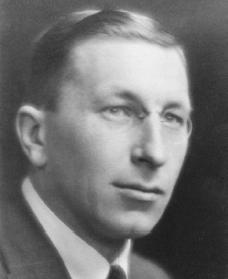 Sir Frederick Grant Banting KBE MC FRS FRSC (November 14, 1891 – February 21, 1941) was a Canadian medical scientist, physician, painter and Nobel laureate noted as the first person to use insulin on humans. In 1923 Banting and John James Rickard Macleod received the Nobel Prize in Medicine. Banting shared the award money with his colleague, Dr. Charles Best. As of November 2016, Banting, who received the Nobel Prize at age 32, remains the youngest Nobel laureate in the area of Physiology/Medicine. The Canadian government gave him a lifetime annuity to work on his research. In 1934 he was knighted by King George V.
Sir Frederick Grant Banting KBE MC FRS FRSC (November 14, 1891 – February 21, 1941) was a Canadian medical scientist, physician, painter and Nobel laureate noted as the first person to use insulin on humans. In 1923 Banting and John James Rickard Macleod received the Nobel Prize in Medicine. Banting shared the award money with his colleague, Dr. Charles Best. As of November 2016, Banting, who received the Nobel Prize at age 32, remains the youngest Nobel laureate in the area of Physiology/Medicine. The Canadian government gave him a lifetime annuity to work on his research. In 1934 he was knighted by King George V.Banting was appointed Senior Demonstrator in Medicine at the University of Toronto in 1922. The following year he was elected to the new Banting and Best Chair of Medical Research, endowed by the Legislature of the Province of Ontario. He also served as Honorary Consulting Physician to the Toronto General, the Hospital for Sick Children, and the Toronto Western Hospital. At the Banting and Best Institute, he researched silicosis, cancer, and the mechanisms of drowning. In 1938, Banting's interest in aviation medicine resulted in his participation with the Royal Canadian Air Force (RCAF) in research concerning the physiological problems encountered by pilots operating high-altitude combat aircraft.
 Banting headed the RCAF's Number 1 Clinical Investigation Unit (CIU), which was housed in a secret facility on the grounds of the former Eglinton Hunt Club in Toronto. During the Second World War he investigated the problems of aviators, such as "blackout" (syncope). He also helped Wilbur Franks with the invention of the G-suit to stop pilots from blacking out when they were subjected to gravitational forces while turning or diving.:255 Another of Banting's projects during the Second World War involved using and treating mustard gas burns. Banting even tested the gas and antidotes on himself to see if they were effective.
Banting headed the RCAF's Number 1 Clinical Investigation Unit (CIU), which was housed in a secret facility on the grounds of the former Eglinton Hunt Club in Toronto. During the Second World War he investigated the problems of aviators, such as "blackout" (syncope). He also helped Wilbur Franks with the invention of the G-suit to stop pilots from blacking out when they were subjected to gravitational forces while turning or diving.:255 Another of Banting's projects during the Second World War involved using and treating mustard gas burns. Banting even tested the gas and antidotes on himself to see if they were effective.Prior to the award of the Nobel Prize in Physiology or Medicine for 1923—which he shared with Macleod—he received the Reeve Prize of the University of Toronto (1922). In 1923, the Canadian Parliament granted him a Life Annuity of $7,500. In 1928 Banting gave the Cameron Lecture in Edinburgh. He was a member of numerous medical academies and societies in Canada and abroad, including the British and American Physiological Societies, and the American Pharmacological Society. In 1934 he was knighted as a Knight Commander of the Order of the British Empire (KBE) and became an active Vice-President of the Diabetic Association (now Diabetes UK). In May, 1935 he was elected a Fellow of the Royal Society.